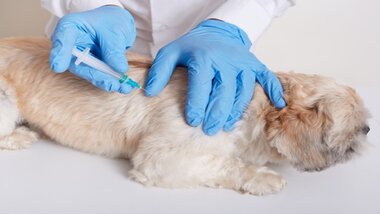When you bring a puppy home, you also assume a great responsibility. The puppy’s health and well-being are now in your hands.
If you take little prevention, it will not only save you money but also prolong the life of your dog. Shots or Vaccines are the most essential protection for your puppy’s health.
Proper vaccination can protect your dog from different infectious and life-threatening diseases. If you’re wondering what the puppy’s shot schedule should be, then you should read the article below.
It is important to have the necessary knowledge about the puppy shot schedule so that when you visit your vet, you can easily understand the recommendation of vaccination.
Vaccines and shots are a suspension of live or dead pathogens, such as viruses and bacteria that will slightly boost the immune system and keep your puppy safe from future infections.
Why are puppy shots important?
Vaccination is an essential and effective way to prevent serious diseases and improve your dog’s health.
Here are some potential reasons why your puppy needs vaccinations, such as:
- Protection against infectious diseases by building or increasing immunity.
- Minimize the risk of spreading zoonotic diseases such as rabies and leptospirosis.
- Helps control the spread of the disease to other pets, especially dogs
- Save your money and give you peace of mind
- Certain dog parks, boarding and shelter home, necessitate specific vaccinations
- In many states, local laws require vaccination in dogs.
What are the Core and non-core Vaccinations in puppies?
Core vaccinations
Core vaccinations are recommended and necessary for each puppy in a particular geographic location or area due to the severity of the disease, universal risk of exposure, and the threat of transmission.
The following dog vaccines are core vaccination, according to the American Animal Hospital Association, such as:
- Canine Parvovirus
- Canine Distemper
- Canine Hepatitis
- Rabies
Non-core vaccines
Non-core vaccines are recommended based on the puppy’s geographic location, local climate, and lifestyle.
Your vet may recommend these non-core vaccines in certain circumstances, such as:
- Bordetella
- Canine Parainfluenza
- Leptospirosis
- Lyme disease
- Coronavirus
Puppy Shot Schedule Printable
There is no universal vaccination available because lots of aspects are taken into account for making a puppy shots schedule. Always follow the puppy vaccination schedule given by your vet.
This is the general guideline about puppy shots schedule include puppy shot schedule parvo.
| Age of a puppy | Core Vaccinations | Optional Vaccinations |
| 6 to 8 weeks | DHPP (D=Distemper, H= Hepatitis [adenovirus], P= Parainfluenza P=Parvovirus) |
Bordetella |
| 8 to 12 weeks | DHPP | Lyme disease, Bordetella Leptospirosis, Coronavirus |
| From 12 weeks | Rabies | None |
| 14 to 16 weeks | DHPP | Coronavirus, Leptospirosis, Lyme disease |
| 12 to 16 months | Rabies, DHPP | Coronavirus, Leptospirosis, Lyme disease, Bordetella |
| Every year | None | Lyme disease, Bordetella Leptospirosis, Coronavirus |
| Every 3 years (after the first-year booster) | DHPP | None |
| Every 1 to 3 years | Rabies (according to the law) | None |
Reference of this Table: https://barkingroyalty.com/puppy-vaccination-schedule/
FAQS About Vaccination In Dogs
I lost my dog vaccination history. What should I do?
When you go to the vet, you must take the entire vaccination record with you, but there is nothing to worry about if you somehow lost that record. If you regularly go to that vet, he may have your puppies’ vaccination record in his database and get it from there. Otherwise, if you remember when the last vaccine was given and how many vaccines your puppy received, it can also help understand vaccination history.
However, if you don’t remember any of this, the best way is to get the titers done. It will also help to know if your dog is protected or not and, at the same time, if it is necessary to revaccinate or not. So if you come across such a situation, get the titer done and see where your dog stands in terms of protection, and see if there is any need for vaccination or not.
Can I give my dog vaccination orally instead of by injection?
All dog owners want the vaccination period to be less stressful for their dogs. Many pet owners have been seen asking about the different ways to get their pets vaccinated. One of the most frequently asked questions is: can I vaccinate my dog orally?
The answer to this is that only a vaccine-like Bordetella can be given orally or through nasal drops. All the remaining vaccines need to be injected. However, to make the vaccination procedure less stressful, your veterinarian will distract your pet so he will not get nervous.
What is the fine for expired dog vaccines?
It depends on where you live; most of the time, there is no penalty for expired dog vaccines. Although the best thing for our dog is to be up to date on its vaccination. However, in some states, there is a strict policy on rabies vaccination. If you haven’t got that vaccination done, they won’t let you in. Otherwise, titration is the best way to know if your dog is protected or not.
Are yearly dog vaccine extended?
According to research, not all vaccines require annual boosters. However, after completing the first year vaccination, a second vaccination is recommended after 1 year, and the booster shot every 3 years.
Do you have to be licensed to administer dog vaccines?
It is essential that the vaccine is performed by a licensed veterinarian; otherwise, it will not be accepted as a valid and legal vaccine. Suppose the vaccination is performed by an unlicensed person. In that case, you will not have certified proof of vaccination required according to the state’s protocol. In fact, the vaccination certificate for the rabies vaccine is necessary for relocation and international travel.
Is there any place giving dog vaccines for free?
There are certain rescue groups, local animal welfare organizations, and shelters present in every state that offer free or low-cost vaccinations. If you are looking for a free vaccination camp, find a rescue group or welfare organization in your area.
Conclusion
Vaccination is crucial to the well-being of your pet. Even if your puppy can recover from certain illnesses, it can cause discomfort and a lot of pain with expensive veterinary bills.
Always discuss your puppy’s shots schedule with your vet because it is developed based on your puppy’s lifestyle and underlying diseases.




